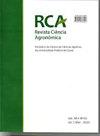Salt stress and K/Ca ratios of the nutrient solution in the production and quality of the melon
IF 0.7
4区 农林科学
Q3 AGRICULTURE, MULTIDISCIPLINARY
引用次数: 0
Abstract
- Melon cultivation under saline conditions is a challenge, as the plants can suffer a reduction in fruit production and quality. The aim of this study was to evaluate the production and quality of noble melon fruit fertigated with different saline solutions and K/Ca ratios. The experimental design was of randomised blocks, with treatments arranged in a 3 x 6 factorial scheme, using three melon cultivars (Bazuca, McLaren, County) fertigated with six nutrient solutions [S1 – standard nutrient solution (SNS); S2 – SNS + NaCl (5.0 dS m -1 ); S3 – S2 enriched with K (50%); S4 – S2 enriched with K (100%); S5 – S2 enriched with Ca (50%); S6 – S2 enriched with Ca (100%)]. At the end of each cultivar cycle, the fruit was harvested and assessed for the following parameters: fresh fruit weight, fruit diameter, internal cavity, pulp thickness, pulp firmness, soluble solids content, titratable acidity, soluble solids/titratable acidity ratio, and vitamin C. Salt stress impaired the physical characteristics of the fruit of the three noble melon cultivars. The nutrient solution enriched with 50% K (S3) did not reduce the effect of salt stress on fresh weight or fruit size in the melon, but afforded an increase in fruit quality.盐胁迫与营养液钾钙比对甜瓜生产品质的影响
本文章由计算机程序翻译,如有差异,请以英文原文为准。
求助全文
约1分钟内获得全文
求助全文
来源期刊

Revista Ciencia Agronomica
Agricultural and Biological Sciences-Horticulture
CiteScore
2.00
自引率
0.00%
发文量
41
审稿时长
4-8 weeks
期刊介绍:
To publish technical-scientific articles and study cases (original projects) that are not submitted to other journals, involving new researches and technologies in fields related to Agrarian Sciences. Articles concerning routine analysis, preliminary studies, technical notes and those which merely report laboratorial analysis employing traditional methodology will not be accepted for publication. The Journal of Agronomical Science also has the mission to promote the exchange of experience in the referred fields.
 求助内容:
求助内容: 应助结果提醒方式:
应助结果提醒方式:


